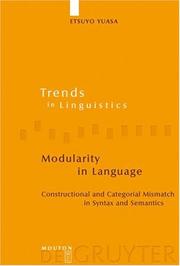| Listing 1 - 4 of 4 |
Sort by
|

ISBN: 3110183099 9786613428370 1283428377 3110197529 Year: 2005 Volume: 159 Publisher: Berlin Mouton de Gruyter
Abstract | Keywords | Export | Availability | Bookmark
 Loading...
Loading...Choose an application
- Reference Manager
- EndNote
- RefWorks (Direct export to RefWorks)
In Modularity in Language, Etsuyo Yuasa investigates exceptions and idiosyncrasies in various complex clauses in Japanese and English within the framework of multi-modular approaches to grammar. She proposes original analyses of various complex clauses in Japanese and English, which deviate from the norms of other complex clauses in the same language or in other languages, and shows how these cases of syntax-semantics mismatch justify the independence (or 'autonomy') of different levels of grammatical structures. Yuasa's significant contribution is the incorporation of the notion of 'construction' from Construction Grammar into multi-modular approaches to grammar. She claims that the idiosyncratic cases examined in this study are instances of constructional and categorial mismatches where a syntactic representation of a prototypical construction is paired with a semantic representation of another prototypical construction. Modularity in Language is aimed at those interested in grammatical theories in general, the parallel architecture of grammar (including Lexical-Functional Grammar, Autolexical Grammar, Representational Modularity), Constructional Grammar, syntax/semantics interface, and Japanese linguistics.
Categorial grammar. --- Grammaire catégorielle --- Japonais (Langue) --- Japanese. --- Japonais --- Grammaire catégorielle --- 801.56 --- 801.56 Syntaxis. Semantiek --- Syntaxis. Semantiek --- Categorial grammar --- English language --- Grammar, Comparative and general --- Japanese language --- Semantics --- Formal semantics --- Semasiology --- Semiology (Semantics) --- Comparative linguistics --- Information theory --- Language and languages --- Lexicology --- Meaning (Psychology) --- Koguryo language --- Syntax --- Modularity (Grammar) --- Module (Grammar) --- Germanic languages --- Grammar, Categorial --- Grammar, Comparative&delete& --- Japanese --- Modularity --- English --- Lexicology. Semantics --- Grammar --- Semantics. --- Syntaxe --- Sémantique --- Anglais (Langue) --- Syntax. --- Grammar, Comparative --- English. --- Grammaire comparée --- Anglais --- Modularity. --- Linguistics --- Philology --- Grammar, Comparative and general Syntax --- Grammar. --- Japanese /language.
Book
ISBN: 9783110197525 Year: 2009 Publisher: Berlin Boston
Abstract | Keywords | Export | Availability | Bookmark
 Loading...
Loading...Choose an application
- Reference Manager
- EndNote
- RefWorks (Direct export to RefWorks)
Digital
ISBN: 9783110197525 9783110183092 Year: 2009 Publisher: Berlin ;; Boston De Gruyter Mouton
Abstract | Keywords | Export | Availability | Bookmark
 Loading...
Loading...Choose an application
- Reference Manager
- EndNote
- RefWorks (Direct export to RefWorks)
Book
ISBN: 9789027255594 9789027287120 9027287120 1283093162 9781283093163 9027255598 9786613093165 6613093165 Year: 2011 Publisher: Amsterdam [Netherlands] ; Philadelphia [Pa.] : John Benjamins Pub. Co.,
Abstract | Keywords | Export | Availability | Bookmark
 Loading...
Loading...Choose an application
- Reference Manager
- EndNote
- RefWorks (Direct export to RefWorks)
Autolexical Grammar (AG) explains both the coherent systematicity and the pervasive idiosyncrasies present in natural language through a unified, multimodular approach moderated by lexical constraints. This chapter presents recent research in cognitive neuroscience that bears on the representational strengths of AG. While AG does not strive to be a psycholinguistic model of cognitive processing in real time, the ability of AG to represent mismatch and resolution as formal constraints, and the emphasis that AG places on the lexicon as the moderating factor in constraint satisfaction, provides descriptive mechanisms that can further illuminate cognitive approaches to language processing.
Autolexical theory (Linguistics). --- Grammar, Comparative and general --- Hierarchy (Linguistics). --- Pragmatics. --- Syntax. --- Autolexical theory (Linguistics) --- Hierarchy (Linguistics) --- Stratification (Linguistics) --- Hierarchies --- Linguistic analysis (Linguistics) --- Linguistics --- Compositionality (Linguistics) --- Generative grammar --- Language and languages --- Syntax --- Pragmalinguistics --- General semantics --- Logic, Symbolic and mathematical --- Semantics (Philosophy) --- Philosophy --- Philology --- Grammar, Comparative and general Syntax
| Listing 1 - 4 of 4 |
Sort by
|

 Search
Search Feedback
Feedback About UniCat
About UniCat  Help
Help News
News